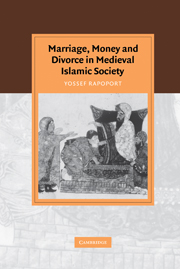Book contents
- Frontmatter
- Contents
- Acknowledgments
- Glossary
- List of abbreviations
- Introduction
- Chapter 1 Marriage, divorce and the gender division of property
- Chapter 2 Working women, single women and the rise of the female ribāṭ
- Chapter 3 The monetization of marriage
- Chapter 4 Divorce, repudiation and settlement
- Chapter 5 Repudiation and public power
- Conclusion
- Bibliography
- Index
- Cambridge Studies in Islamic Civilization
Chapter 2 - Working women, single women and the rise of the female ribāṭ
Published online by Cambridge University Press: 15 June 2009
- Frontmatter
- Contents
- Acknowledgments
- Glossary
- List of abbreviations
- Introduction
- Chapter 1 Marriage, divorce and the gender division of property
- Chapter 2 Working women, single women and the rise of the female ribāṭ
- Chapter 3 The monetization of marriage
- Chapter 4 Divorce, repudiation and settlement
- Chapter 5 Repudiation and public power
- Conclusion
- Bibliography
- Index
- Cambridge Studies in Islamic Civilization
Summary
In the year 655/1257–58, after ten years of marriage, the Damascene scholar Shihāb al-Dīn Abū Shāma composed a poem in praise of his wife, Sitt al-῾Arab bt. Sharaf al-Dīn al-῾Abdarī. After mentioning her noble lineage, Abū Shāma proceeds to commend her impeccable character. Sitt al-῾Arab is modest and obedient to her husband, attends to her family and shows mercy to orphans. She is wise, while striving to understand what she does not know, and eloquent, her words are like pearls. She guards the secrets of the house, and the property of her husband:
Better still, to her all this virtue/
is no burden, but comes natural/
Do not reproach me for my love for her/
for few of the women of her age are her equal/
At our wedding she was a girl of fourteen/
with all these traits already installed/
She never strayed from that path/
and each passing year her virtue increased manifold/
What more to say: in ten years with me/
she has never given me any reason to complain.
An extraordinary feature of the poem is the realistic appreciation of Sitt al-῾Arab's contribution to the household economy. Abū Shāma writes:
She always attends to household chores
despite her youth she shies away from nothing
ṭirāz embroidery, needlework with golden threads
cutting cloth, sewing and spinning
She moves from this to that and from that to this
not to mention the cleaning, the cooking and the washing.
- Type
- Chapter
- Information
- Marriage, Money and Divorce in Medieval Islamic Society , pp. 31 - 50Publisher: Cambridge University PressPrint publication year: 2005



